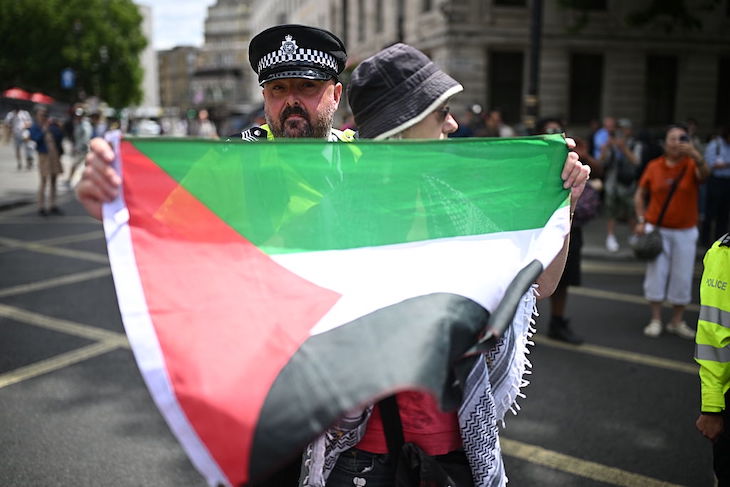Palestine Action’s attempt to defy a ban on their protest outside parliament yesterday was one of the most vital tests of Sir Mark Rowley’s five-year term as Commissioner of the Metropolitan Police. It was a test he passed and the Met should be applauded – but the police’s robust response to this dangerous far-left extremist group must not be a one off.
The police’s robust response to this dangerous far-left extremist group must not be a one off
For too long, members of the public, Parliamentarians and Parliamentary staff have been harassed, abused and intimidated at protests in Parliament Square. Too often, the authorities in Westminster have been timorous in their approach to disruptive protestors.
Perhaps most troublingly, and as Policy Exchange has previously shown, Parliamentarians have been blocked from accessing the Parliamentary Estate to undertake their constitutional duties. In the behind-the-scenes bargaining between protestors and the police, it is the wider public – and the sanctity of our Parliamentary democracy – that have been the losers.
But this week was different: the government and police finally said: ‘No more’. The long overdue crackdown followed Palestine Action’s stunt on Friday at RAF Brize Norton, where they caused many millions of pounds of damage to military aircraft and put the safety of our armed forces personnel at risk, both at home and abroad.
On Monday, their target was Westminster, where the group declared their intention to assemble at the Houses of Parliament for an ’emergency mobilisation’. This was because the government have finally recognised Palestine Action for what they are: an organisation which requires proscription under section 3 of the Terrorism Act 2000. This is a group which has targeted people, universities, businesses, military installations and factories. Members of the group are alleged to have caused millions of pounds of criminal damage and assaulted a police officer with a sledgehammer.
Section 4 of the Terrorism Act 2000 states that an organisation can be proscribed if they commit, participate in, prepare for, promote or are otherwise concerned in terrorism. The Home Secretary Yvette Cooper has announced that she intends to lay a draft proscription order in Parliament on 30 June. If the order is passed it will become illegal to be a member of, or invite support for, Palestine Action.
On Sunday night, Sir Mark Rowley, set out a newly-found muscular approach to dealing with this particular group. It is a disappointing reality that there have been years of inadequacy on the part of the police in dealing with protests in Westminster – but it became apparent that the Commissioner now intends to chart a different course.
The law does not currently allow static protest assemblies to be banned – only protest marches can be banned in very limited circumstances. However, the law does allow, under Section 14 Public Order Act 1986, the police to impose conditions on protest assemblies. The conditions the Met applied to Monday’s protest required that any assembly would not be permitted to start before 12 noon and must have finished by 3pm. The group would also be excluded from protesting in a large area surrounding the curtilage of the Palace of Westminster – including Parliament Square, Whitehall, Westminster Bridge and Millbank. In particular, the Commissioner made clear that the police would use their powers to: ‘prevent disorder, damage, and serious disruption to the community, including to Parliament, to elected representatives moving around Westminster and to ordinary Londoners.’
The protest organisers, in response to the police conditions, chose to move their activities to Trafalgar Square – albeit they rather embarrassingly found access to the Square impeded by workers busily taking down staging following various events from the weekend.
Throughout the protest, officers robustly policed the conditions they had lawfully applied. Several arrests were made, including when protestors attempted to block the road. Most importantly, by excluding the protest from the immediate area surrounding the Palace of Westminster – including nearby parts of our key national infrastructure – Parliamentarians were able to undertake their constitutional duties on our behalf without impediment.
Finally, the authorities seem to have woken up to what is required to protect the rule of law and democracy in our country. The policing of Monday’s protest clearly shows what is possible when the police and government take seriously the threats from those willing to cause serious disruption. It also demonstrates what is possible whether cases such as R v Ziegler are overturned or not. When the police and authorities fail to use the powers afforded them in law, as set down by Parliament, it harms us all.







Comments